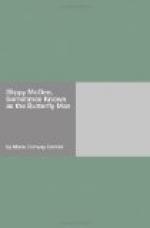Folks got used to him, as one does to anything one sees daily. The pleasant conservative soft-voiced ladies who liked to call on Madame of an afternoon and gossip Christianly, and drink tea and eat Clelie’s little cakes on our broad shady verandah, only glanced casually at the bent head and shoulders visible through the screened window across the garden. They said he was very interesting, of course, but painfully shy and bashful. As for him, he was as horribly afraid of them as they would have been of him, had they known. I could not always save myself from the sin of smiling at an ironic situation.
Judge Mayne had at first eyed the man askance, watching him as his own cats might an interloping stray dog.
“The fellow’s not very prepossessing,” he told me, of an evening when he had dined with us, “but I’ve been on the bench long enough to be skeptical of any fixed good or bad type—I’ve found that the criminal type is any type that goes wrong; so I shouldn’t go so far as to call this chap a bad egg. But—I hope you are reasonably sure of him, father?”
“Reasonably,” said I, composedly.
“Laurence tells me Madame and Mary Virginia like the fellow. H’m! Well, I’ve acquired a little faith in the intuition of women—some women, understand, and some times. And mark you, I didn’t say judgment. Let us hope that this is one of the times when faith in intuition will be justified.”
Later, when he had had time to examine the work progressing under the flexible fingers of the silent workman, he withdrew with more respect.
“I suppose he’s all right, if you think so, father. But I’d watch out for him, anyway,” he advised.
“That is exactly what I intend to do.”
“Rather he fell into your hands than mine. Better for him,” said the judge, briefly. Then he launched into an intimate talk of Laurence, and in thus talking of the boy’s future, forgot my helper.
That was it, exactly. The man was so unobtrusive without in the least being furtive. Had so little to say; attended so strictly to his own business, and showed himself so utterly and almost inhumanly uninterested in anybody else’s, that he kept in the background. He was there, and people knew it; they were, in a sense, interested in him, but not curious about him.
One morning in early autumn—he had been with us then some eight or nine months—I went over to his rooms with a New York newspaper in my hand. It had news that set my heart to pounding sickeningly—news that at once simplified and yet complicated matters. I hesitated as to whether or not I should tell him, but decided that whatever effect that news might produce, I would deal with him openly, above board, and always with truth. He must act and judge for himself and with his eyes open. On my part there should be no concealment.




